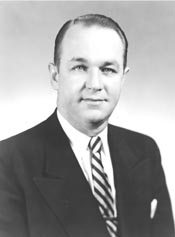William Thomas Cahill
| William Thomas Cahill | |
|---|---|
 |
|
| 46th Governor of New Jersey | |
|
In office January 20, 1970 – January 15, 1974 |
|
| Preceded by | Richard J. Hughes |
| Succeeded by | Brendan Byrne |
| Member of the U.S. House of Representatives from New Jersey's 6th district |
|
|
In office January 3, 1967 – January 19, 1970 |
|
| Preceded by | Florence Dwyer |
| Succeeded by | Edwin B. Forsythe |
| Member of the U.S. House of Representatives from New Jersey's 1st district |
|
|
In office January 3, 1959 – January 3, 1967 |
|
| Preceded by | Charles A. Wolverton |
| Succeeded by | John E. Hunt |
| Member of the New Jersey General Assembly | |
|
In office 1951-1953 |
|
| Personal details | |
| Born |
June 25, 1912 Philadelphia, Pennsylvania |
| Died | July 1, 1996 (aged 84) Haddonfield, New Jersey |
| Political party | Republican |
| Spouse(s) | Elizabeth M. Cahill |
| Alma mater |
Saint Joseph's University Rutgers University-Camden |
William Thomas Cahill (June 25, 1912 – July 1, 1996) was an American Republican Party politician who served as the 46th Governor of New Jersey, from 1970 to 1974, and who represented New Jersey's 1st congressional district in the U.S. House of Representatives from 1959 to 1967 and the state's 6th district from 1967 to 1970.
Born in Philadelphia to Irish immigrant parents, Cahill moved to South Jersey with his family in 1919. He attended Camden Catholic High School in Camden, New Jersey, and graduated in 1929. Afterwards, Cahill graduated St. Joseph's College (now Saint Joseph's University) at Philadelphia in 1933. He returned to Camden to study at the Rutgers School of Law - Camden, receiving his law degree in 1937.
In 1937 and 1938, Cahill was a special agent of the Federal Bureau of Investigation. In 1939 he was admitted to the bar and began his political career. Living in Collingswood, New Jersey, Cahill was the city prosecutor of Camden, New Jersey in 1944 and 1945, was the first assistant prosecutor of Camden County from 1948–51 and was a special deputy attorney general of the State of New Jersey in 1951. Cahill was a member of the New Jersey General Assembly from 1951-53. Cahill was elected to the Eighty-sixth and to the five succeeding Congresses. During his tenure in the US House, Cahill crossed the aisle and voted for LBJ's Civil Rights Act of 1964 and the Voting Rights Act of 1965.[1] He served in the US House until his resignation from his congressional seat to assume his seat as governor, serving from January 3, 1959 to January 19, 1970.
...
Wikipedia
